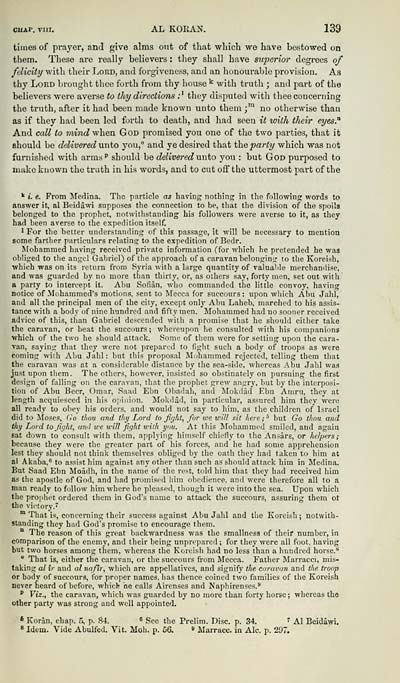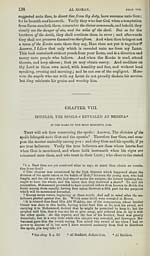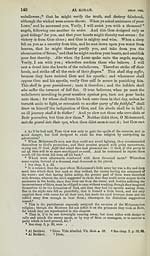Download files
Complete book:
Individual page:
Thumbnail gallery: Grid view | List view

cuAP. viii. AL KORAN. 139
times of prayer, and give alms out of that which we have bestowed on
them. These are really believers : they shall have superior degrees of
felicity with their Lord, and forgiveness, and an honourable provision. As
thy Lord brought thee forth from thy house ^ with truth ; and part of the
believers were averse to thy directions ;' they disputed with thee concerning
the truth, after it had been made known unto them f^ no otherwise than
as if they had been led forth to death, and had seen it with their eyes^
And call to 7?iirec?when God promised you one of the two parties, that it
should be delivered unto yoii,° and ye desired that the party which was not
furnished with arms p should be delivered unto you : but God purposed to
make known the truth in his words, and to cut off the uttermost part of the
* i. e. From Medina. The particle as having nothing in the following words to
answer it, al Beidawi supposes the connection to be, that the division of the spoils
belonged to the prophet, notwithstanding his followers were averse to it, as they
had been averse to the expedition itself.
1 For the better understanding of this passage, it will be necessary to mention
some farther particulars relating to the expedition of Bedr.
INIohamnied having received private information ffor which he pretended he was
obliged to the angel Gabriel) of the approach of a caravan belonging to the Koreish,
which was on its return from Syria with a large quantity of valuable merchandise,
and was guarded by no more than thirty, or, as others say, forty men, set out with
a party to intercept it. Abu Sofian, who commanded the little convoy, having
notice of Mohammed's motions, sent to Mecca for succours : upon which Abu Jahl,
and all the principal men of the city, except only Abu Laheb, marched to his assis-
tance with a body of nine hundred and fifty men. Mohammed had no sooner received
advice of this, than Gabriel descended with a promise that he should either take
the caravan, or beat the succours ; whereupon he consulted with his companions
which of the two he should attack. Some of them were for setting upon the cara-
van, saying that they were not prepared to fight such a body of troops as were
coming with Abu Jahl : but this proposal Mohammed rejected, telling them that
the caravan was at a considerable distance by the sea-side, whereas Abu Jahl was
just upon them. The others, however, insisted so obstinately on pursuing the first
design of falling on the caravan, that the prophet grew angry, but by the interposi-
tion of Abu Beer, Omar, Saad Ehn Obadah, and Mokdad Ebn Amru, they at
length acquiesced in his opinion. Mokdad, in particular, assured him they were
all ready to obey his orders, and would not say to him, as the children of Israel
did to ]\foses, (,o thou and tliy Lord to fiylu, fur we will sit here;^ but Go thou and
thy Lord tojight, ami we tvill fc/ht with you. At this Mohammed smiled, and again
sat down to consult with them, applying himself chiefly to the Ansars, or helpers;
because they were the greater part of his forces, and he had some apprehension
lest they should not think themselves obliged by the oath they had taken to him at
al Akaba,^ to assist him against any other than such as should attack him in Medina.
But Saad Ebn Moadh, in the name of the rest, told him that they had received him
as the apostle of God, and had promised him obedience, and were therefore all to a
man ready to follow him where he pleased, though it were into the sea. Upon which
the prophet ordered them in God's name to attack the succours, assuring them ot
the victory."
" That is, concerning their success against Abu Jahl and the Koreish ; notwith-
standing they had God's promise to encourage them.
° The reason of this great backwardness was the smallness of theif number, in
comparison of the enemy, and their being unprepared ; for they were all foot, having
but two horses among them, whereas the Koreish had no less than a hundred horse.''
" That is, either the caravan, or the succours from Mecca. Father Marracci, mis-
taking al ir and al nafir, which are appellatives, and signify the curavan and the troop
or body of succours, for proper names, has thence coined two families of the Koreish
never heard of before, which he calls Airenses and Naphirenses.^
" Viz., the caravan, which was guarded by no more than forty horse ; whereas the
other party was strong and well appointed.
* Koran, chap. 5., p. 84. * See the Prelim. Disc. p. 34. " Al Beidawi,
^ Idem. Vide Abulfed. Vit. Moh. p. 66. » Marracc. in Ale. p. 207.
times of prayer, and give alms out of that which we have bestowed on
them. These are really believers : they shall have superior degrees of
felicity with their Lord, and forgiveness, and an honourable provision. As
thy Lord brought thee forth from thy house ^ with truth ; and part of the
believers were averse to thy directions ;' they disputed with thee concerning
the truth, after it had been made known unto them f^ no otherwise than
as if they had been led forth to death, and had seen it with their eyes^
And call to 7?iirec?when God promised you one of the two parties, that it
should be delivered unto yoii,° and ye desired that the party which was not
furnished with arms p should be delivered unto you : but God purposed to
make known the truth in his words, and to cut off the uttermost part of the
* i. e. From Medina. The particle as having nothing in the following words to
answer it, al Beidawi supposes the connection to be, that the division of the spoils
belonged to the prophet, notwithstanding his followers were averse to it, as they
had been averse to the expedition itself.
1 For the better understanding of this passage, it will be necessary to mention
some farther particulars relating to the expedition of Bedr.
INIohamnied having received private information ffor which he pretended he was
obliged to the angel Gabriel) of the approach of a caravan belonging to the Koreish,
which was on its return from Syria with a large quantity of valuable merchandise,
and was guarded by no more than thirty, or, as others say, forty men, set out with
a party to intercept it. Abu Sofian, who commanded the little convoy, having
notice of Mohammed's motions, sent to Mecca for succours : upon which Abu Jahl,
and all the principal men of the city, except only Abu Laheb, marched to his assis-
tance with a body of nine hundred and fifty men. Mohammed had no sooner received
advice of this, than Gabriel descended with a promise that he should either take
the caravan, or beat the succours ; whereupon he consulted with his companions
which of the two he should attack. Some of them were for setting upon the cara-
van, saying that they were not prepared to fight such a body of troops as were
coming with Abu Jahl : but this proposal Mohammed rejected, telling them that
the caravan was at a considerable distance by the sea-side, whereas Abu Jahl was
just upon them. The others, however, insisted so obstinately on pursuing the first
design of falling on the caravan, that the prophet grew angry, but by the interposi-
tion of Abu Beer, Omar, Saad Ehn Obadah, and Mokdad Ebn Amru, they at
length acquiesced in his opinion. Mokdad, in particular, assured him they were
all ready to obey his orders, and would not say to him, as the children of Israel
did to ]\foses, (,o thou and tliy Lord to fiylu, fur we will sit here;^ but Go thou and
thy Lord tojight, ami we tvill fc/ht with you. At this Mohammed smiled, and again
sat down to consult with them, applying himself chiefly to the Ansars, or helpers;
because they were the greater part of his forces, and he had some apprehension
lest they should not think themselves obliged by the oath they had taken to him at
al Akaba,^ to assist him against any other than such as should attack him in Medina.
But Saad Ebn Moadh, in the name of the rest, told him that they had received him
as the apostle of God, and had promised him obedience, and were therefore all to a
man ready to follow him where he pleased, though it were into the sea. Upon which
the prophet ordered them in God's name to attack the succours, assuring them ot
the victory."
" That is, concerning their success against Abu Jahl and the Koreish ; notwith-
standing they had God's promise to encourage them.
° The reason of this great backwardness was the smallness of theif number, in
comparison of the enemy, and their being unprepared ; for they were all foot, having
but two horses among them, whereas the Koreish had no less than a hundred horse.''
" That is, either the caravan, or the succours from Mecca. Father Marracci, mis-
taking al ir and al nafir, which are appellatives, and signify the curavan and the troop
or body of succours, for proper names, has thence coined two families of the Koreish
never heard of before, which he calls Airenses and Naphirenses.^
" Viz., the caravan, which was guarded by no more than forty horse ; whereas the
other party was strong and well appointed.
* Koran, chap. 5., p. 84. * See the Prelim. Disc. p. 34. " Al Beidawi,
^ Idem. Vide Abulfed. Vit. Moh. p. 66. » Marracc. in Ale. p. 207.
Set display mode to: Large image | Transcription
Images and transcriptions on this page, including medium image downloads, may be used under the Creative Commons Attribution 4.0 International Licence unless otherwise stated. ![]()
| Early Gaelic Book Collections > J. F. Campbell Collection > Koran: or, Alcoran of Mohammed > (293) |
|---|
| Permanent URL | https://digital.nls.uk/77137318 |
|---|
| Description | Volumes from a collection of 610 books rich in Highland folklore, Ossianic literature and other Celtic subjects. Many of the books annotated by John Francis Campbell of Islay, who assembled the collection. |
|---|
| Description | Selected items from five 'Special and Named Printed Collections'. Includes books in Gaelic and other Celtic languages, works about the Gaels, their languages, literature, culture and history. |
|---|

